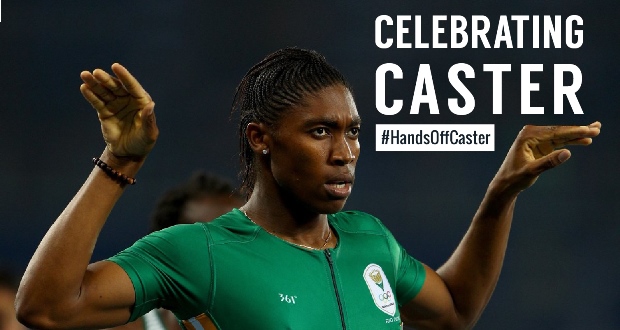In the wake of Caster Semenya’s world-shaking win at the 2016 Rio Olympics, I set out on the streets of Johannesburg to get a sense of how South Africans were responding to Semenya’s golden victory and the controversy – along with the white tears – that surrounded it.
First stop, Park Station.
As a Joburger who’s been dispatched in the Cape colony for the last six or so years, I tend to feel a bit of a tourist when driving through the city – I get lost. Like a lot.
Thulani Bhengu, 38, from Bergville was the first person I met at Park Station. He was friendly guy chatting away with the other staff working at the station. He warned me that his English was not very fluent, and that I might prefer speaking to someone else, but this was obviously not a concern.
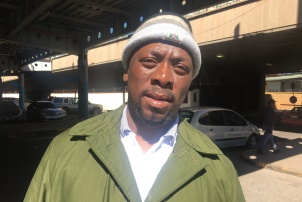
I next met Mandlankosi Dombela, 23, from Soweto near the entrance to station. He and his friend were more than keen to be interviewed by the media. I always have trouble breaking it to people that we don’t have our own news channel – especially when they’re uber excited about the prospect of being on TV. I personally share in their excitement at being on TV more than I’d care to admit – so maybe one day The Daily Vox can branch out into TV and give these folks a chance?
Mandlankosi Dombela, 23, Soweto – Motswaledi says @lynseysharp “is just jealous” #CasterSemenya pic.twitter.com/VKoXZ1eCUi
— Mohammed Jameel (@indie_impimpi) August 22, 2016
After entering Park Station I was soon reminded how awkward it really was to have a stranger come up to you and ask for an interview. Eventually, I came to accept that Park Station was no doubt full of haters with little interest in athletics, patriotism or the deep probing eyes of a journalist.
And so I paid a visit to Wits – students love to talk, right?
Thato Rachamose, 20, a second-year actuarial science student was the first person I met chilling with his two friends who seemed too shy to be interviewed. Thato knew more than most I had spoken to about the dynamics of the race itself.
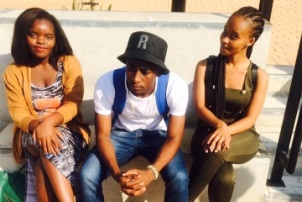
I think over time, people have tended to focus on the wrong things regarding Caster. Because every single person is different to another. And the fact that she has a bit more of something [testosterone] does not have to isolate her. I mean, if she isn’t classified as a female now, then where must she go? I think that Caster’s haters, especially that British one, are just bitter losers. They just couldn’t bear the fact that they lost.â€
Georgina Hyland 20, spoke of the inherent contradictions of trying to police the levels of testosterone in women athletes.
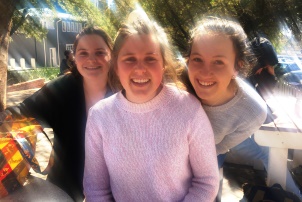
Caster’s win is specifically important to the queer community, because it shows that just because you don’t fit a certain description doesn’t you have to limit your ambitions. I think Caster being an Olympian has played a role in our support of Caster, because even the people who have previously criticised her and said that she shouldn’t compete in these events have suddenly supported her.â€
Kelly Margarita, 19, was sitting at the engineers’ cafe with her friends who elected her as the best option to speak on the matter.
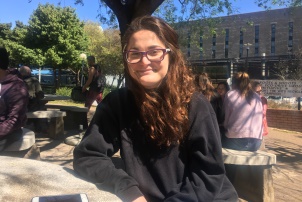
I think the controversy surrounding Caster’s body has nothing to do with the race itself. Yes, she may have increased testosterone levels of whatever – but she’s still a female. She should be competing with the women, not men. [Lyndsey Sharp] was never going to win anyway, she was 6th! I think her and Caster’s haters are just sore losers. They probably look at her physique and see that she’s a lot more muscular than most women, but at the day she’s still a woman. So Lyndsey must either get better or come in 6th place.â€
Last but not least was Vera Fourie, a 19-year-old engineering student who chased away her friends so she could do the interview properly. She seemed to have thought longest over Caster’s position and what it meant in the broader scheme of things in SA.
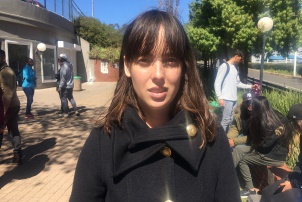
The current world-record holder [for women’s 800m], I mistook for a man when I first saw the picture because of her muscle level so I don’t think people are being very consistent with their complaints.
And obviously there must have been thousands of tests before the Olympics, so can it be said to be her fault that none of these tests picked up Caster’s heightened testosterone beforehand? And then suddenly picked it up afterwards? It just feels unfair to Caster. It seems doubly unfair because even now she’s been cleared of everything, people will still latch onto that.
I think it the reaction to Caster’s win might affect the queer community negatively because even if you’re queer you’re still allowed to have dreams, and this controversy about Caster would probably put you off pursuing any type of Olympic event. Because if she wins – she gets shit. If she loses – she gets shit. It’s like she can’t win even if she does.â€
Overall it was a long day, but a few things became clear to me: South Africans remain fully behind Caster, are probably still quite confused regarding issues of queerness – but we’re proud of our champion.
Oh, and of course, Lynsey Sharp and her white tears ain’t shit.

